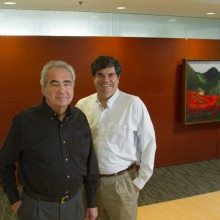
WashingtonExec, in partnership with the Fairfax Chambers of Commerce, kicked off a series profiling government contractors nominated for the 9th Annual Greater Washington Government Contracting Awards. Interviewed nominees include small, mid-size and large “Executive of the Year” as well as “Contractor of the Year” finalists. The winners will be announced on November 1st at the Ritz Carlton in Tysons Corner.
This quick bi-weekly series asks nominees direct questions as to how they achieved success and notoriety in the GovCon community.
Today’s series includes responses from CEO Brian Sharkey and Executive Vice President Dr. Doyle Weishar of the technology and engineering research company i_SW. i_SW is nominated as “Contractor of the Year” in the less than $25 million division.
WashingtonExec: People always talk about corporate culture, but what is something that your company purposely focuses on to create and emulate the ideal company culture?

Brian Sharkey: Our corporate culture can best be described with four factors. One, we take care of our employees as family, they are our most important product and we want them to remain gainfully employed, working on interesting technical problems, and within a pleasant and friendly working environment. Secondly, we encourage transparency of all operations to the greatest extent possible. Our quarterly Board meetings are open to all employees, our stock and cash bonus award process is published for all to understand, we have weekly all-hands staff meeting and bi-monthly division luncheons to encourage communications and relay status of company achievements and issues. Third, we push down management responsibility to the lowest organization level possible. This benefits the employee with ever increasing growth opportunities, while ensuring that the company’s technical and management workforce gets stronger as we grow. Finally, the largest component of our company culture is centered on the belief in the value of employee ownership, wherein all employees are given the opportunity to own stock in the company and enjoy the possibility of acquiring individual wealth as the company grows.
WashingtonExec: Obtaining top talent in the private sector is fierce. How does your company not only draw top talent, but maintain it?

Dr. Doyle Weishar: Attracting and retaining a talented and highly technical workforce is critical to the success of our business. To find top talent, we have developed a vigorous recruiting process lead by a highly competent, and internally sourced, full-time recruitment manager. This process enables us to continuously and aggressively seek out outstanding candidates. While we do the usual things for recruiting (e.g., job fairs, resume databases, web site postings), we find that that most benefit comes from word-of-mouth recruiting from our employees to their colleagues. Therefore, we offer a generous referral bonus for many of our hard-to-fill positions. To ensure quality, we conduct thorough and robust interviews that involve people at all levels of our organization. We try to ensure that a candidate is technically qualified, is motivated to work to achieve our high standards, and is one who will fit in well with our overall corporate culture. Because our business is people, we invest in whatever time it takes to find the right person for the job.
To attract and retain our employees, we offer highly challenging and professionally fulfilling work, excellent salary and bonus compensation, a fringe benefit package that is in the top 5% of all competing companies, and the potential for company stock ownership. We strive to be a fully employee owned company with 100% participation. Our strong belief is that all employees should benefit from the growth of the company by being awarded company stock at a rate that is commensurate with their individual efforts and potential for continuing to grow the company.
WashingtonExec: In your opinion, how does a company stay nimble when it is in a period of large growth and expansion?

Brian Sharkey: One always hopes for periods of large growth and expansion, but as your question suggests, growth and expansion do generate challenges. To stay nimble, it is first and foremost important to diversify and not allow the company to become overly dependent on one (or a few) customers in a particular market sector. Secondly, I believe that it is important to push down responsibilities for management and market expansion to the lowest organization level possible, and to encourage employees on the ground to listen to their customers and to be alert for expansion of current work and opportunities for business in new directions. Finally, it is vital to be receptive and to listen to ideas for growth that may stem from any level of the company, and to fully embrace the need for change at all times. Striving for transparency of operations, participatory idea generation, an “open door policy” at the highest levels, and a receptivity to change, enables a company to remain highly nimble.
WashingtonExec: How has the tightening of the lending market impacted you?

Dr. Doyle Weishar: Fortunately for us, we have not seen a direct impact of the tightening of the lending market on our business thus far. We have an excellent track record of judiciously using our credit facilities and promptly paying back any funds that are borrowed. Typically this occurs at the end of year when managing cash flow is intensive. Also, since our corporate strategy is to internally finance our growth through reinvestment of excess profit, we are able to keep our dependency on banks to a minimum. However, a positive relationship with a bank and the need to borrow money when needed is a necessary prerequisite for any successful business, and we have been fortunate to be able to secure the credit facilities that are needed. However, incremental tightening of credit terms over past years has been observed. So far, that tightening (for example, in terms of additional covenants on our line of credit) has not caused us undo impact. Nevertheless, we are concerned about this trend and remain vigilant and constantly monitor our financial performance so that we do not jeopardize our ready availability to credit, which is very important to our growth and stability.

